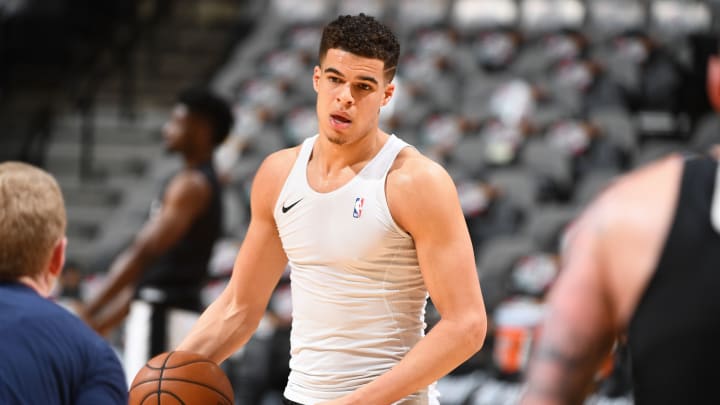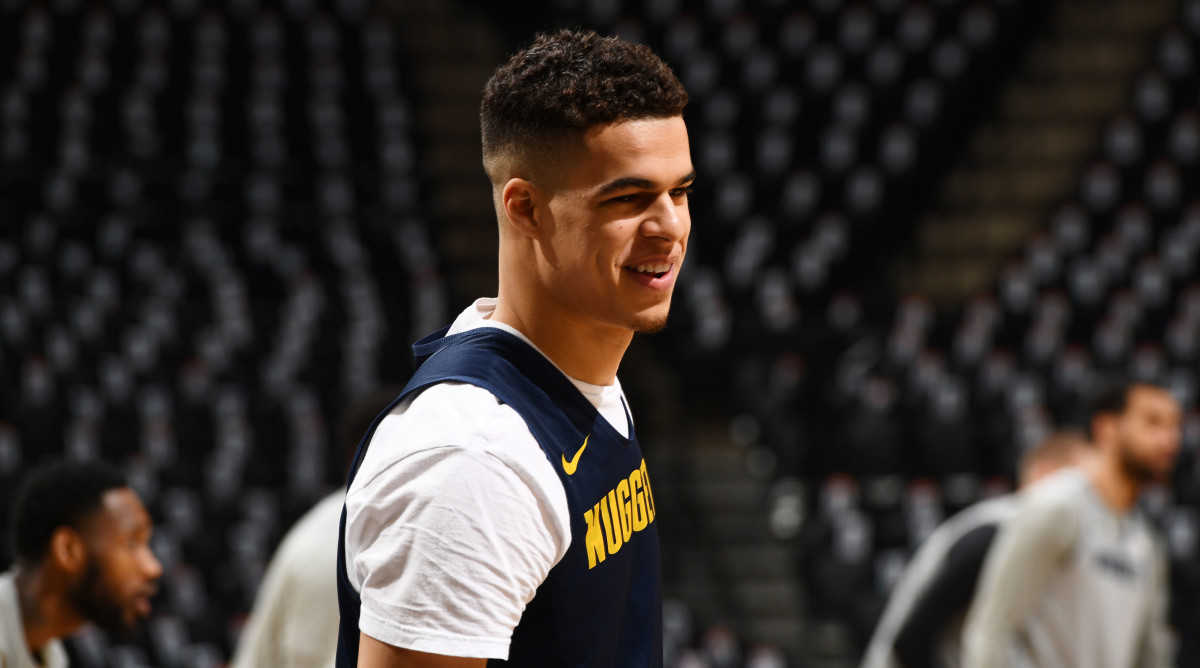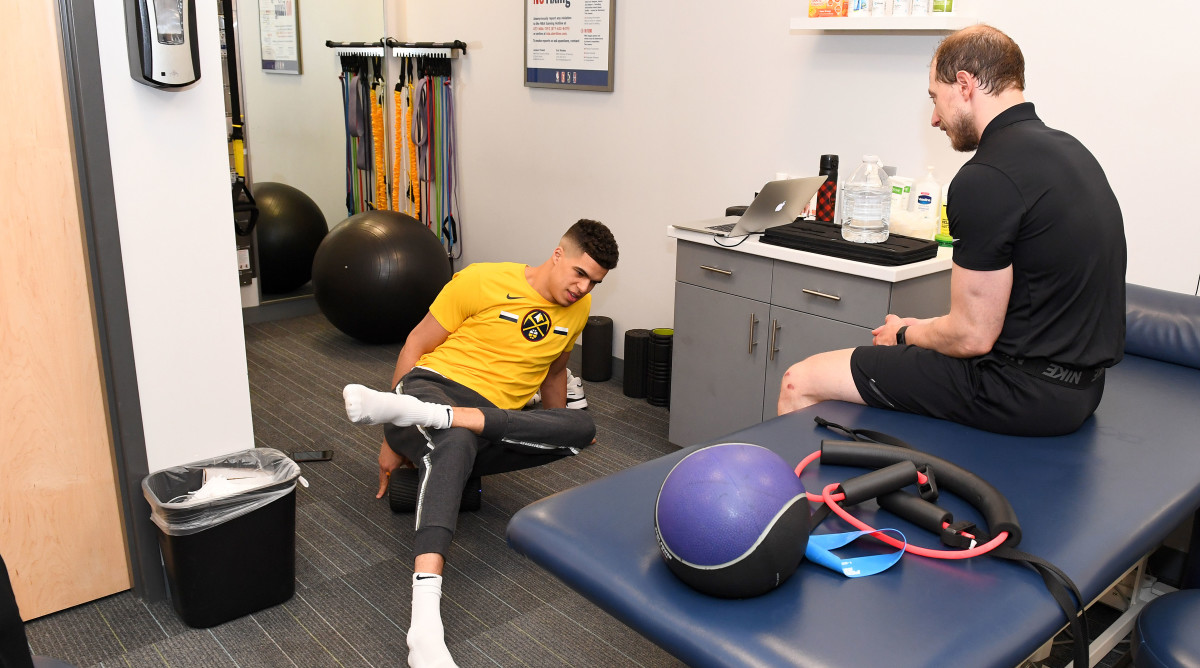Michael Porter Jr. Wants to Be the NBA's Next Big Gap-Year Success

LAS VEGAS — Between plummeting to No. 14 in the 2018 NBA Draft and being ruled out for the 2019 Summer League with a knee strain, Michael Porter Jr. inked five Hebrew letters on his left wrist. His given name in the ancient language, printed as מִיכָאֵל on his arm, loosely translates in English to "who is like God?" It’s a rhetorical query, implying no person is akin to a deity. Mortality and the sheer vulnerability of flesh and bone are ample evidence to support that claim. And there may be no supremely talented 21-year-old better acquainted with the limitations of a human body than the Nuggets’ rookie swingman.
“I wish I could be out here playing,” Porter Jr. says, en route to his suite in one of The Strip’s swanky hotels. “They wanted to be precautionary with me.” He’s returned to the expansive room to grab a change of clothes for Denver’s afternoon shootaround, having already sweat through a black Puma Basketball t-shirt and red, slim-fit joggers. A curving line is shaved into the side of his faded haircut, accompanying an equally curvy, bright smile. Optimism emerged as a staple for Porter Jr. throughout his trying redshirt NBA season, despite the unfavorable circumstances. He learned shortly after the Nuggets scooped him with the last lottery selection Denver had no intention of playing the former No. 1 prospect in his class during the 2018-19 season as he rehabbed a broken back that cost his lone season at Missouri. “It was so heartbreaking, but you know, looking back, it was part of my process,” he says. Hence the new tattoo.
Porter Jr., who will wear the PUMA Legacy shoe next season, is quick to note perhaps the most famous recent NBA redshirt success story. Spending a full calendar on the sidelines, observing the world’s premier basketball league from the inside, can function like discovering the answers to a test a day in advance. “Same thing happened with Ben Simmons,” Porter Jr. says. “You get a whole year off to see what the league’s like, when you start playing, you have a huge advantage over other rookies.” Blake Griffin poses another starry example. Porter Jr. harbors another edge. When Sacramento closely examined him for the No. 2 pick in last June’s draft, the Kings’ team psychologist engaged the curious prospect in a three-hour evaluation, testing for aptitude and personality. His composite score graded amongst an elite percentile in Sacramento’s extensive database littered with the results of students from Yale and Harvard. In kind, Porter Jr. approached this past campaign as much a student as a player.

Denver’s coaching staff emphasized the importance of establishing routine. Porter Jr. observed Isaiah Thomas and Paul Millsap’s travel habits, how veterans ice their ailing limbs on team flights and manipulate their bodies into slumber after waging on-court battle an hour earlier. He began stashing a blender in his luggage to more efficiently concoct nutritious smoothies on the road. On the court, the Nuggets simulated game situations for Porter Jr. as often as possible. “All of that kind of encompasses that player development program for him,” says Denver assistant coach John Beckett. The Nuggets’ staff quizzed its youngster in myriad read-and-react scenarios, where Porter Jr. had to decide if he would shoot or drive. “Once he drives, is it going to be a floater or a reverse layup? Can he finish strong with a dunk?” Beckett says. “He needs those type of reps.”
Despite his inactivity, the Nuggets guided Porter Jr. to establish a gameday routine as well. He’d arrive at the arena roughly three hours before tip-off, change into gear and activate his rehabilitating body. After ample time on the training table, Beckett and the rest of Denver’s player development staff ran Porter Jr. through a pregame shooting regimen. He’d retreat back to the locker room, ice and receive a massage before joining teammates at the chapel. Porter Jr. would have preferred watching Denver’s games from the team’s film room, just as Kevin Durant lingered backstage during Golden State’s postseason run. The tease of sitting courtside, only inches of hardwood separating a player from the game he loves, can prove unbearable—especially as Nikola Jokic and Jamal Murray emerged as transcendent, rising superstars leading a powerhouse.
Porter Jr. joked with Thomas and Jarred Vanderbilt for reprieve on the end of Denver’s bench. The trio formed a supportive group of rehabilitating Nuggets. Vanderbilt, a fellow 2018 draftee, worked his way back from an ankle injury. Thomas, of course, struggled to return from a nagging hip issue that cost him nearly all of the past two seasons. The latter set the tone inside Denver’s training room, as all three jockeyed for bluetooth control of the speaker system. “I got to see him every day attacking rehab,” Porter Jr. says. “I didn’t want to rehab a lot of days. When one of us would have a tough day, one of us would encourage the other one.” Perhaps the most challenging afternoon arrived the date Porter Jr.’s younger brother Jontay tore his ACL and MCL in October, only adding to a lengthy family history. The boys’ older sisters both medically retired due to multiple knee surgeries. A vicious narrative quickly emerged online: The Porters just can’t stay healthy. “You gotta take breaks from social media and just really focus on you,” Porter Jr. says.

Denver’s staff helped hone Porter Jr.'s attention toward envisioning himself in Michael Malone’s whirring offense. His isolation-heavy style, shimmying and shaking as a high school star before unfurling step-back jumpers, won’t necessarily blend with Murray and Jokic’s high-screen action. “We’re trying to get him to understand shot selection and time and score,” Beckett says. “A shot that you take in the first quarter might not be good when there are two minutes left in the fourth.” Defensively, few elite grassroots superstars are schooled in the intricacies of pick-and-roll coverage. At the NBA level, a weak-side defender stationed along the baseline must jolt into the paint to tag the rolling rival big man, and then burst back out to his primary assignment. If that foe is a gifted shooter, the defender must then run his opposition off the three-point line. And Denver’s coaches don't believe the responsibilities end there. “Make multiple efforts, come back in the play and make a rearview contest,” Beckett says. “All those little things like that we’re trying to get him to understand.”
Porter Jr. has passed those tests so far with flying colors, just as he giggled during a draining Sacramento questionnaire so many prospects moan throughout. The most encouraging element may be his affinity for the grind. “The energy that he has is like infectious. It gets everybody else going,” Beckett says. “Very rarely do I have to tell him to go game speed. There’s a lot of guys that you have to coach on the effort part.”
Now, the experimental start to his professional career has nearly come to a close. Porter Jr. felt comfortable enough to play in Las Vegas if Denver’s medical team was willing to greenlight the rookie. Should he emerge as a legitimate second unit scorer—one with the upside of a bonafide flamethrower—Porter Jr. could morph into an intriguing factor atop the loaded West.
In a conference suddenly ruled by superstar duos, Denver’s own dynamic pairing remains as staunch a partnership as any—Los Angeles (times two), Houston and Utah be damned. The Nuggets added Jerami Grant in a stealthy supplemental move. Bol Bol arrives as another low-cost, high-upside gamble one season after Porter Jr.’s trial. If you take the Missouri product’s word for it, that gambit has already spit out one positive result. “I’m ready to play,” he says. “And soon.”
